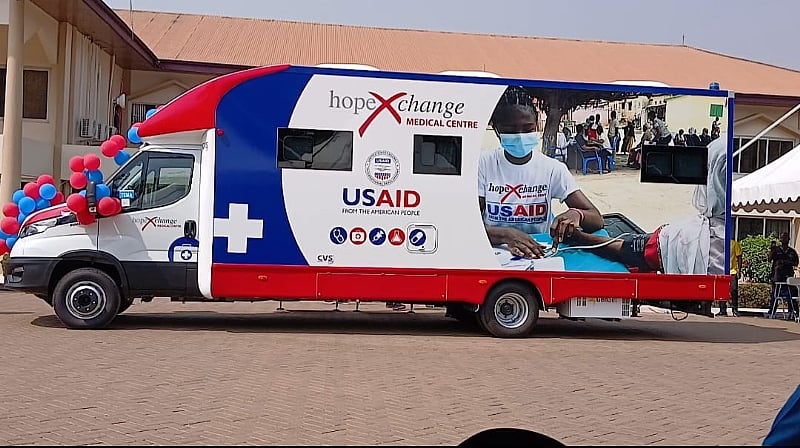The United States Agency for International Development (USAID) has demonstrated its commitment to improving global health outcomes by donating a $200,000 mobile health clinic to HopeXchange Medical Center in Ghana. This generous contribution signifies a significant stride towards enhancing healthcare accessibility for underserved communities, particularly those in remote areas with limited access to traditional medical facilities. The mobile clinic project embodies a strategic approach to bridging the healthcare gap and empowering Ghanaian communities with essential medical services. It signifies a collaborative effort between USAID and HopeXchange, aligning with broader global health initiatives aimed at achieving equitable healthcare access for all.
The mobile clinic stands as a beacon of hope for numerous Ghanaians, particularly those residing in remote areas where healthcare access is often limited or nonexistent. Equipped with state-of-the-art medical equipment and staffed by dedicated healthcare professionals, the clinic is poised to deliver a wide range of essential services. These encompass health education and preventive screenings, critical for early disease detection and management, as well as specialized medical consultations and treatments, catering to diverse health needs within the communities served. The mobile nature of the clinic allows it to traverse vast distances, reaching even the most isolated villages and bringing vital healthcare directly to the doorsteps of those who need it most. This proactive approach not only addresses immediate health concerns but also fosters a culture of preventative care, empowering individuals to take ownership of their health and well-being.
The clinic’s capacity to provide comprehensive medical services is a crucial aspect of its impact. From conducting routine check-ups and health screenings to providing specialized care for various medical conditions, the mobile clinic functions as a versatile healthcare unit. The inclusion of an ultrasound machine, echocardiogram machine, and a refrigerator for vaccines highlights the clinic’s ability to handle a broad spectrum of healthcare needs, from diagnostic imaging to preventative vaccinations. This comprehensive approach ensures that individuals receive the appropriate level of care regardless of their location, reducing the need for long and often costly journeys to urban centers for medical attention.
The management of HopeXchange Medical Center has underscored their dedication to maximizing the impact of this valuable resource. By implementing stringent measures for maintenance and operational efficiency, the center aims to ensure the clinic’s long-term sustainability and its capacity to serve those most in need. This commitment echoes the spirit of the donation, ensuring that the mobile clinic continues to deliver its vital services to communities across Ghana for years to come. The emphasis on serving everyone regardless of their ability to pay underscores the humanitarian nature of the project, aligning with the core principles of equitable healthcare access.
The donation of the mobile clinic aligns strategically with USAID’s broader mission of fostering sustainable development and improving global health outcomes. By partnering with local organizations like HopeXchange Medical Center, USAID effectively leverages local expertise and community networks to maximize the impact of its initiatives. This collaborative approach ensures that healthcare interventions are culturally sensitive, contextually appropriate, and tailored to the specific needs of the communities being served. The mobile clinic project is a prime example of how strategic partnerships can translate into tangible positive changes in healthcare access and delivery.
Dr. Zohra Balsara, USAID/Ghana Health Office Director, eloquently articulated the transformative potential of the mobile clinic. By bringing preventive, promotive, and curative healthcare services directly to the doorsteps of individuals unable to travel to urban health centers, the clinic effectively dismantles geographical barriers to healthcare access. This model of healthcare delivery not only improves health outcomes but also empowers individuals and communities to proactively engage in their health management. The mobile clinic stands as a testament to the power of innovation and collaboration in addressing pressing healthcare challenges and building a healthier future for all.


